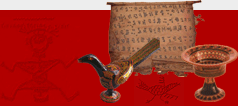戈隆阿弘 Gelong Ahong
云南省红河州群众艺术馆
【摘要】基于彝汉文古籍的记载和地下出土文物的考证,作者认为中原历史上的伏羲、炎、黄、羌、藏、楚都属于古夷(尼)部族,在血缘文化上与西南夷有千丝万缕的联系。他们的先民同样发源于云贵高原,随着人口增长,不断分支向西南、西北,向中原迁徙,分布到了整个西部、长江、黄河流域,直到东海之滨的广大地区,成为中国境内远古时期人口最多、规模最大的部落族群,汉以后才逐步被人们所遗忘。本文作为一篇中国史前史和民族文化发展史的专题研究,对古夷所具有的共同文化特征进行了独到的探索,并对由此引起的许多学术问题作出了深刻思考。
Abstract
Based on research using information recorded in Yi and
Han language historical documents, as well as excavated
archaeological artifacts, the author believes that the figures
Fuxi, the emperors Yan (Shen Nong) and Huang, as well as
the Qiang, Zang, and Chu peoples, found in the history of
the Central Plains of North China, all belong to a tribal
division known as the ancient Yi, which have numerous connections
of kinship and descent with the Southwestern Yi. Their ancestors
similarly originated from the Yunnan-Guizhou Plateau, and
as their population increased, they continually spread and
migrated to the Southwest, the Northwest, and the Central
Plains, and occupied a broad area including the entire West
of China, as well as the Yangtze and Yellow River valleys,
extending to the Pacific coast, becoming the most populous
and widespread tribal group within the boundaries of ancient
China. Only after the Han dynasty, were they gradually forgotten.
This paper performs a specialized prehistoric and ethnohistorical
analysis, exploring the common features of the Ancient Yi
culture, as well as conducting a penetrating exegesis of
the many scholarly questions raised.
|
作者简介:
戈隆阿弘(施友万),男、彝族。云南省红河哈尼族、彝族自治州石屏县人。1934年10月17日生于石屏县龙朋镇桃园村。中共党员,1960年毕业于部队中师。职称:副研究馆员。1951年志愿参军,在部队工作31年,历任战士、文书、参谋、干事、政治处副主任。1982年9月转业到红河州群众艺术馆任刊物编辑室主任,主编《红河文化》十余年,1994年12月退休。中国少数民族作家学会、歌谣学会、群文学会、民俗学会会员。中国城市文化研究中心研究员,中国管理科学院学术委员会特约研究员、《发现》杂志理事,中国《评论月刊》特邀评论员,云南省作家协会、民间文艺家协会、曲艺家协会会员,曾任红河州彝学会第一、二届会长。1960年前后开始业余文艺创作。转业到地方后,投入群众文化工作和彝族历史文化研究,同时兼搞文学创作。先后出版了彝族民间叙事长诗《塔培茨与妮薇》、《朵卡若与顿薇妮》,彝族民间歌谣集《尼苏情歌》、《彝族阿哩》,中篇民俗小说集《吃火草烟的人》,纪实文学集《南滇纪事》,长篇小说《烟盒情话》,学术论文集《彝族历史文化论丛》,学术专著《彝族古代史研究》,以“十月太阳历”和刻划文字为标志,追溯了彝族的万年发展史,在史学界首次提出“云贵高原是中华民族的原始发源地”;“伏羲、炎、黄、羌、藏、楚及藏缅语族彝语支彝、白、纳西、哈尼、保镖、拉袖、土家等各族都源于彝族先民古夷人”;“彝族先民古夷人曾在中国西南创造过至今还鲜为人知的古夷文明,给予了中原华夏文明乃至世界文明的创建以极大影响”等许多重要观点,引起了中外学者的广泛关注。与人合作发掘整理彝苗两族的民间传统医药学,出版了《象形医学一一彝苗传统医药学精要》一书,提出了以象形物做药治病的概念,大大扩展了中医药学的研究领域,填补了中医学的一大空白,作品和学术论文,先后荣获国际金奖一篇,国际(单项)优秀论文奖一篇,国家级一、二等奖6篇,省级奖5篇。有5篇论文收入《中国当代思想宝库》等国家级大型文献。2003年5月被中华全国理论创新研究会授予“中国二十一世纪百科知名专家”的称号。其略传被收入《中国文艺家传集》、《中国少数民族作家辞典》、《中国专家学者辞典》、《世界华人文学艺术界名人录》、《世界名人录》等众多颇具影响辞书。
About the Authors:
Gelong Ahong (Shi Youwan), a Yi born in 1934 in Taoyuan
Village, Longpeng Township, Shiping County, Honghe Yi and
Hani Autonomous Prefecture. He is a Communist Party member
and a 1960 graduate of a military normal school. He is now
an associate curator. In 1951 he volunteered for the People’s
Liberation Army, and successively served as a battle sergeant,
secretary, advisor, director, and vice political commissar.
In 1982 he changed profession and became head of the editorial
office of the Honghe Prefecture mass culture museum, and
was editor of Honghe Culture for over ten years, retiring
in 1994. He is a member of the Chinese Association of Minority
Writers, The Society for the Study of Songs, The Society
for the Study of Mass Literature, and the Chinese Folklore
Society. He is a Researcher in the Center for the Study
of Urban Culture, a director of the magazine Discovery,
an invited critic for the journal Critical Monthly, and
a member of the Yunnan Writers’ Association, The Society
of Popular Writers and Artists, and the Society of Song
Lyricists, and served two terms as chair of the Honghe Society
for Yi Studies. Before 1960 he had begun creative work as
a hobby, and when he transferred to local work, he went
into mass culture work and research on Yi history, at the
same time doing creative writing. He has published Yi folk
narrative poetry, Tapeici and Niwei and Zaqieruo and Chunweini;
collections of Yi folk songs, Nisu Love Songs and Yi Ali;
a collection of folkloric novellas, The Man who ate the
Smoke from Firegrass; a collection of literary nonfiction,
Stories from South Yunnan; a novel, Intimate Talk in the
Cigarette Box; a scholarly edited volume, A Collection of
Essays on Yi Historical Culture; a scholarly monograph,
Research on Ancient Yi History, using the “Yi ten-month
solar calendar and petroglyphic writings to pursue the 10,000
year history of the development of the Yi, for the first
time in scholarly circles raising many important ideas,
including that “The Yunnan-Guizhou Plateau is the area of
origin of the Chinese People,” that “Fuxi, the Yan and Huang
emperors, and the Qiang, Tibetans, the ancient Chu, and
the Yi, Bai, Naxi, Hani, Baobiao, Lahu, Tujia and other
peoples of the Yi branch of the Tibeto-Burman language family
all have a common origin in ancestors among the Ancient
Yi,” and that “The Ancient Yi, the ancestors of today’s
Yi, invented in the Southwest the Ancient Yi civilization
which is till visible today, and had great influence on
the Huaxia civilization of the Central Plains and even world
civilization,” drawing attention of scholars in China and
abroad. In cooperation with others he discovered and collated
material on the traditional medicine and pharmacology of
the Yi and Miao, and published a book, Pictorial Medicine:
The Essence of Yi and Miao Traditional Medicine and Pharmacology,
raising the concept of sympathetic medicine, greatly expanding
the sphere of research into traditional Chinese pharmacology,
and filling in a great gap in our research into Chinese
medicine. His creative works and scholarly articles have
won one international gold medal, one international prize
for an outstanding essay, one first and six second-class
national prizes, and five provincial-level prizes. Five
of his essays have been collected in The Treasury of Contemporary
Chinese Thought and other large-scale national anthologies.
In 2003 he was given the title of “21st century encyclopedic
specialist” by the All-China Society for Research into Theoretical
Innovation. His biography has been included in Biographies
of Chinese Literary and Artistic Figures, Dictionary of
Chinese Scholarly Biography, World Who’s Who of Ethnic Chinese
Artists and Writers, World Who’s Who and many other influential
reference works. |





